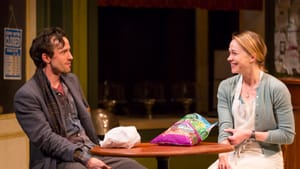Stay in the Loop
BSR publishes on a weekly schedule, with an email newsletter every Wednesday and Thursday morning. There’s no paywall, and subscribing is always free.
Big smallness in McCarter's Five Mile Lake
'Five Mile Lake' by Rachel Bonds

McCarter Theatre Center closes its season with the East Coast premiere of Rachel Bonds's Five Mile Lake on its relatively intimate Berlind Stage. It might do even better in a smaller theater, being a small and quiet play set in a small and quiet town.
While there are several U.S. and Canadian locations called Five Mile Lake, Bonds's fictional backwater is near Scranton, which might as well be Washington State, Minnesota, Mississippi, outer Ontario, or British Columbia to its residents. Philadelphia is like far-off Oz, while New York City is a forbidding foreign land. Five Mile Lake is one of those places that people either escape from or are trapped in — or, in some cases, retreat to.
Former Philly actor Tobias Segal plays Jamie, who runs a little coffee shop and crushes on Kristen Bush's Mary. When his brother Rufus, played by Nathan Darrow, returns from the Big City (Philadelphia) and his stalled Ph.D. dissertation "to make things a little less shitty" in his life with his exotic girlfriend Peta (Mahira Kakkar), a Londoner of Indian descent, he disturbs the slowly perking chemistry between the coworkers.
Bigness hidden in smallness
Bonds's script, in Emily Mann's well-acted production, shows how the tiny intersections of past, present, and (imagined) future generate seismic effects. Through entertaining yet chatty and seemingly inconsequential discussions — about fixing up the brothers' parents' lake house, hockey vs. figure skating, stray cats, and muffin selling — lives shift in fundamental ways. Sure, life is full of small moments. But for these characters, they're made even smaller by this tiny town.
The play's one openly volatile character, Mary's brother Danny (Jason Babinsky), a veteran struggling with PTSD, has only one scene, and his outburst serves mainly to crack open repressed feelings between Rufus and Mary.
Even the play's one big dramatic event seems swallowed by smallness. Seldom have I seen a suicide attempt so anticlimactic, but the characters aren't callous so much as wary. Everyone's eager to escape awkwardly honest emotional sharing, yet they're stuck right here with one another.
Bigness made to look small
Mann's production keeps the action close to the audience, but the play's charming intimacy is created, ironically, with Edward Pierce's large set. A central turntable shows the cafe interior on one side, its back entrance on another, and the lake house on the third. Furniture and even an entire bathroom glide in from the wings. The sets are realistically detailed, as are Jeff Croiter's lighting and Jennifer von Mayrhauser's costumes. Sound designer Daniel Perelstein provides gently sad original music that beautifully frames the play. The effort impresses but sometimes dwarfs the characters and their stories.
Not all plays have to be big, of course. The day after I saw Five Mile Lake, I went to Philadelphia Theatre Company's brownsville song (b-side for tray), which is likewise intimate — five actors playing everyday people, in an urban setting as oppressive as Bonds's country town — but revolves around two violent deaths. They're both successful and worthwhile plays, but Five Mile Lake feels like one brief, albeit important, chapter in relatively safe and plain lives, while brownsville song hits hard, like a momentous book about world-shattering devastation.
Maybe that says more about division in America, though, than about either play.
What, When, Where
Five Mile Lake, by Rachel Bonds. Emily Mann directed. Through May 31, 2015 at McCarter Theatre's Berlind Stage, 91 University Place, Princeton, NJ. 609-258-2787 or www.mccarter.org.
Sign up for our newsletter
All of the week's new articles, all in one place. Sign up for the free weekly BSR newsletters, and don't miss a conversation.

 Mark Cofta
Mark Cofta